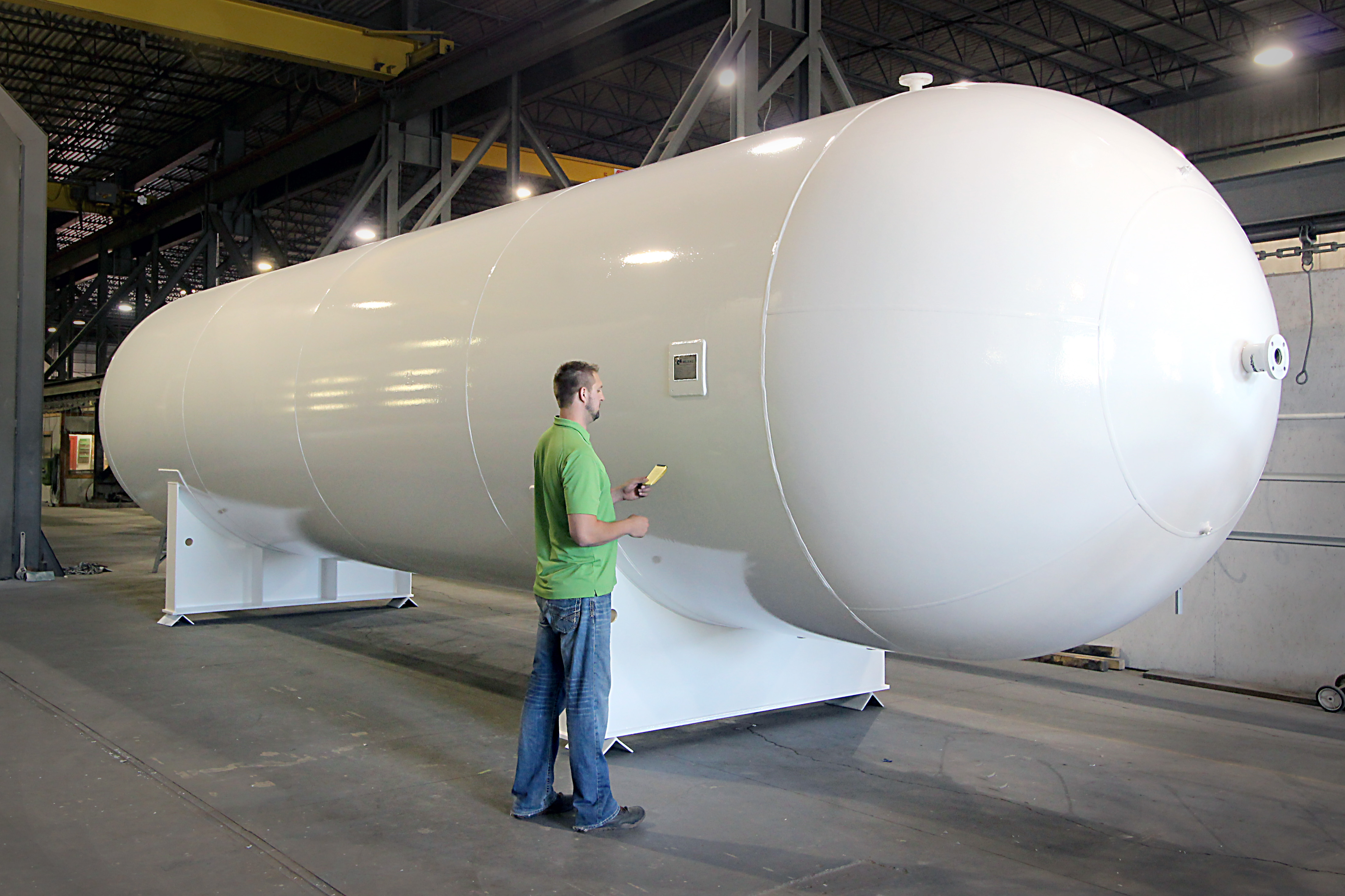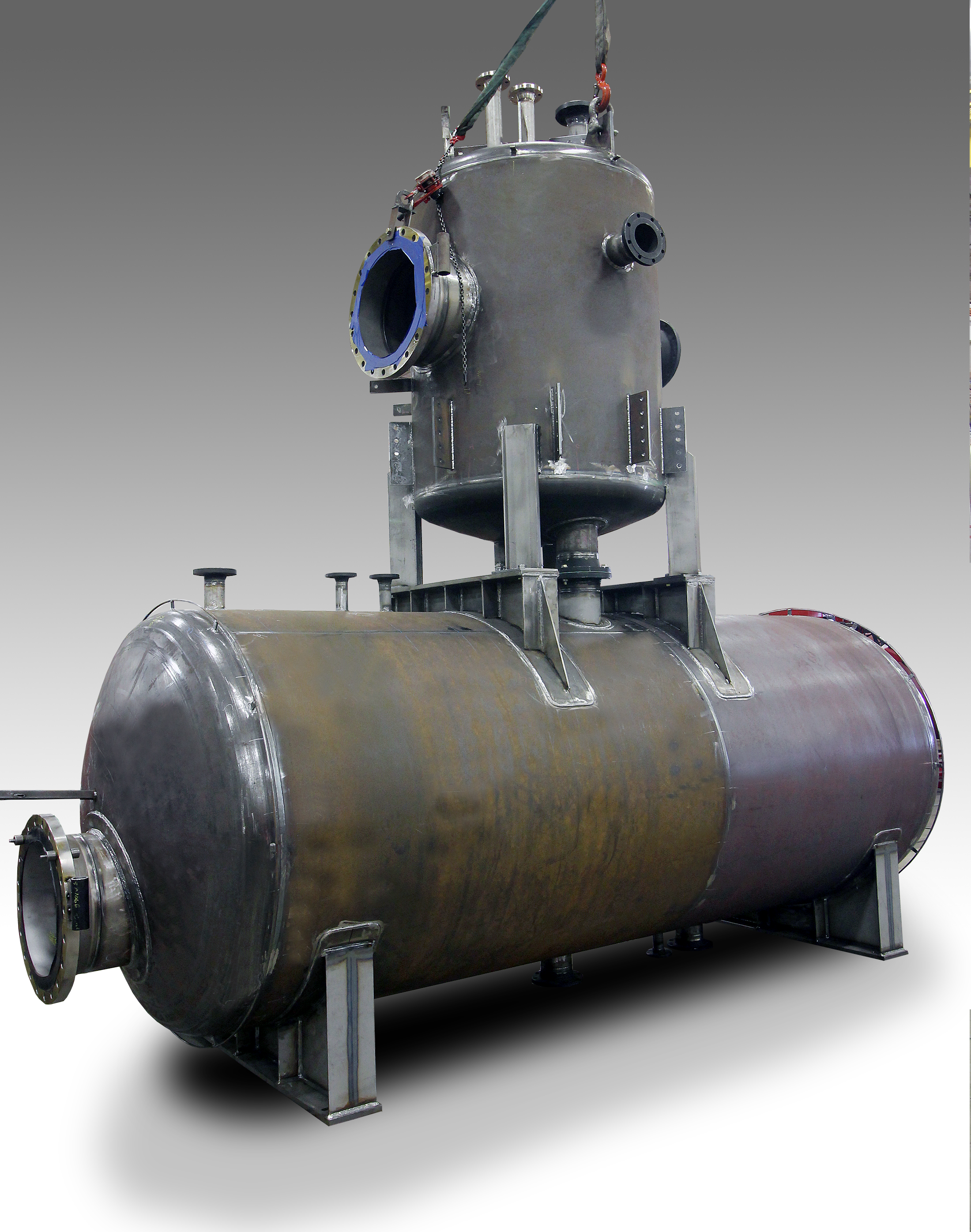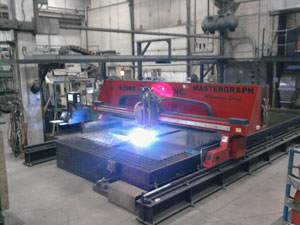Manufacturing Pressure Vessels and Tanks
The primary uses of pressure vessels are for holding storage, processing materials and heat exchangers.

Storage Tanks
Typically manufactured with carbon steel, storage tanks are used for storing liquid and gases, under pressure, for common utilities such as fuel oil, natural gas, propane or liquified hydrogen.
Heat Exchange
A very common type of pressure vessel are Heat Exchangers. These pressure vessels are used for repeatable functions of heating, chilling or condensing.
Process Vessels
Specialized designed drums, reactors or columns or gravity separators are used to create a process in a controlled environment. These processes may be a desired chemical reaction, breaking down materials or joining multiple products together.
Capabilities
Specialty & Critical Welding
- American Welding Society (AWS) certified weld inspectors
- Certified for a wide range of welding codes and processes
- Experience in stainless steel, carbon steel, titanium and other unique metal
Engineering & Manufacturing
- Accredited staff of college degreed engineers
- World-class CAD and CAM system software
- 100,000 square foot of manufacturing space
Quality Assurance & Testing
- Proactive Non-Destructive Testing
- ASME U certified for Pressure Vessel Applications
- American Society of Mechanical Engineers Section VIII, Division I
Request A Quote
Pressure Tanks
C4 understands the urgency of projects, especially those with short time-lines. If you reach out to us with questions, know that we value your interest and will respond as quickly as possible.

Pressure Vessel Fabrication
The construction of a pressure vessel begins with engineering CAD drawings and a design concept that meets ASME (American Society of Mechanical Engineering) Boiler and Pressure Vessel code requirements. The design phase derives and compares the hoop and longitudinal stress formulas based on basic pressure, wall thickness and stress assumptions.
The geometric solution to minimize strain is to create a spherical pressure vessel. However, this is a difficult task that is not very cost effective. Therefore, the solution and vessel shape we see most commonly is a cylindrical shape with a convex or curved head at each end. The cylindrical section of the vessel is developed using a strong material, usually steel, to distribute the pressure strain.
Welding Process
When fabricating a pressure vessel, there are different types of welding processes
used to join pieces together with the use of heat or pressure. Submerged Arc Welding (SAW) is characterized by the use of continuously-fed solid wire electrode which provides an arc that is totally covered by a layer of granular flux. The biggest advantage of SAW is its high deposition rate. It can typically deposit weld metal more efficiently than any of the more common processes.
Gas Tungsten Arc Welding (GTAW) is a versatile welding process that provides the highest quality weld by using a non-consumable tungsten electrode. This method is mostly used for precise, small welds on stainless steel and other materials like aluminum, magnesium and copper alloy.
Gas Metal Arc Welding (GMAW) or “MIG” welding is another popular process. Gas Metal Arc Welding is characterized by a solid wire electrode, which is fed continuously through a welding gun. An arc is created between this wire and the workpiece to heat and melt the base and filler materials. Once molten, the wire becomes deposited in the weld joint. When fabricating pressure vessels, we use MIG/GMAW and TIG/GTAW, with a Sub Arc Welding approach.
Testing and Inspection
In order to meet ASME (American Society of Mechanical Engineering), ANSI (American national Standards Institute) and ASTM (American Society for Testing and Materials) standards, pressure vessels undergo rigorous testing and inspection. Some welding inspections a vessel must pass include X-ray, ultrasonic, visual testing, magnetic particle testing and dye penetrant. Another common requirement for pressure vessels is passing a hydro test. Determining which testing methods are used depends on the type of job the vessel will be used for, but these practices are critical to safety and quality. C4 has CWI’s on staff with ASNT and NDT certifications to ensure all inspection requirements are met.
Industries That Use Pressure Vessels
Pressure vessels are used throughout many industries that include Food & Beverage, Chemical, Pharmaceutical, Plastics, Oil and Gas applications. Much of these industries use pressure vessels to ensure the safety and proper regulation of sensitive materials. These delicate procedures must remain precise to meet all local and international guidelines.

The Food & Beverage industry relies on pressure vessels for various reasons, including food processing, mixing and sanitation. The Oil & Gas industry utilizes pressure vessels for various purposes such as separators, scrubbers, drums, knock-outs, towers, treaters, and filters to name a few. In the pharmaceutical industry, these products are used for research and development and aid in the creation of pharmaceutical drugs that maintain USFDA regulations. Pressure vessels can also be used to create plastics, chemicals and more.
Complex Manufacturing
Comprehensive Solutions
When certified precision is non-negotiable …
When exact specifications must be absolutely achieved or exceeded …
These are the complex manufacturing challenges C4 Welding solves every day.

C4 Welding’s, Commitment to our customer’s success and our community, having a Can – Do and responsive attitude, with the Capacity to quickly scale the operation to support customers’ Critical welding requirements, are the four core tenants that our name is built on, and are the factors that assure our customers they will receive what our name signifies. Learn more about our services.
You Ask, We’ll Answer
Let us know about your upcoming projects.
Street Address: 11 Industrial Blvd. | Sauk Rapids, MN 56379 USA
Phone: 320-253-2699 | Fax: 320.253.4804
Sales-Related Inquiries: 320-253-2699 | Email: sales@c4weld.com
Human Resources-related Inquiries: 320-253-2699 | Email: hr@c4weld.com
Hours of Operation: Monday – Friday: 8:00am – 4:00pm
